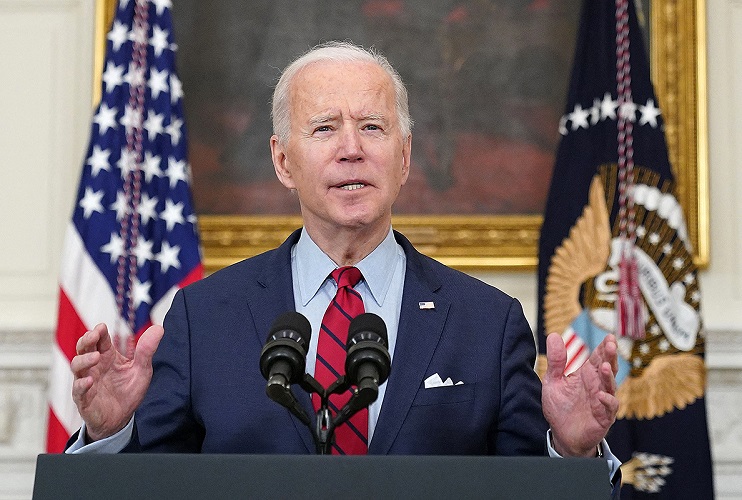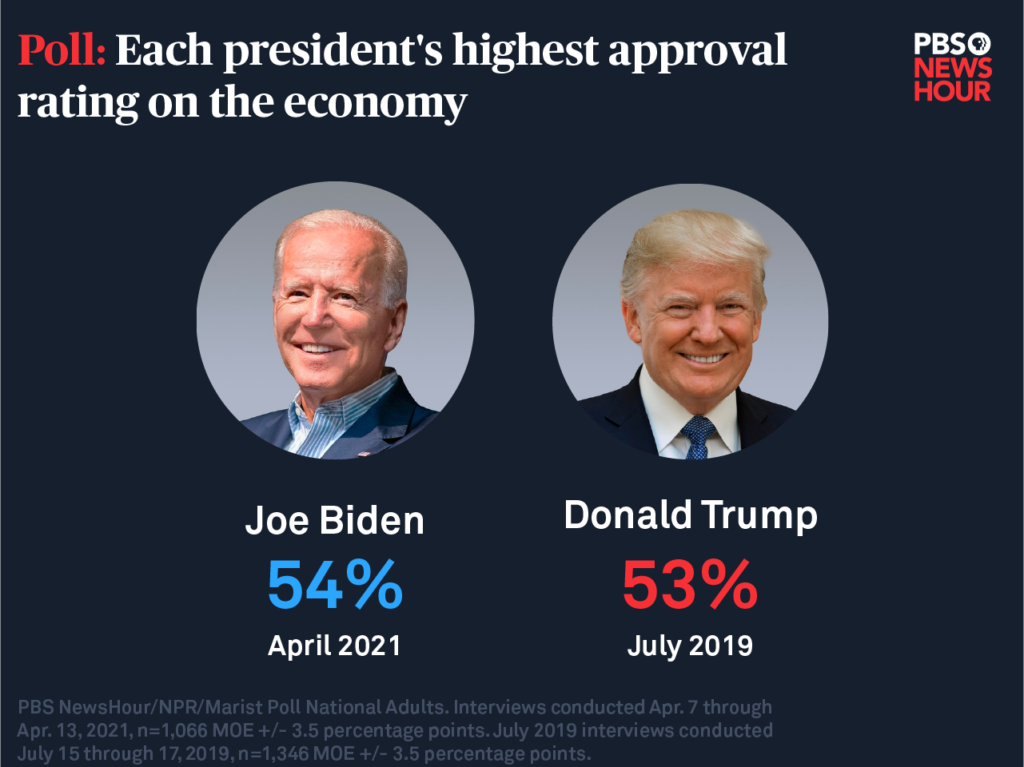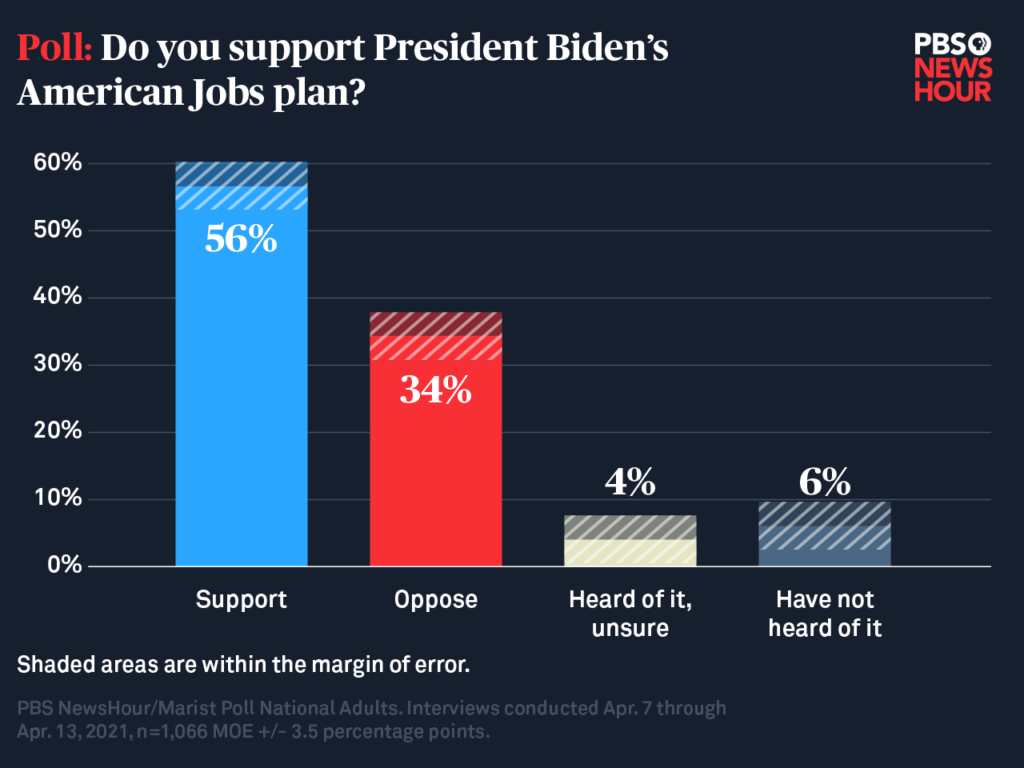
The era of small government, or at least a long chapter in it, ended last year when the economy started sliding into a coma in the midst of the worst health crisis in a century and the deepest economic downturn since the Great Depression.
With millions infected with the coronavirus and millions more unemployed, there was no question the magnitude of the problem required the government to step in boldly, and it did. Now, President Joe Biden is leveraging the crisis to correct problems that existed before the pandemic but became more visible during the disaster.
Big spending had already started under former President Donald Trump. Biden is doubling down and making a sharp turn. His budget proposal, revealed Friday, presses the accelerator to speed away from most of Trump's policies.
Watching Biden over the past 10 weeks, Americans may have wondered what happened to the centrist candidate who won the election. Until now his raft of economic and social programs had little in common with traditional middle-of-the road positions. This budget shows that, despite his aggressive push to leverage the power of the federal government to shape economic and social change, Biden still has enough areas of disagreement with the left wing of the Democratic Party to make decisions that can also bring their blood to a boil.
In a budget filled with hundreds of millions of dollars for education, housing, and poverty alleviation, Biden also fortified the country's already robust defense budget, even expanding it to 1.7% more than the previous year, to a massive $753 billion, a sharp divergence from the 10% cut recommended by Vermont Sen. Bernie Sanders.The defense request, which officials defended as necessary to lead the Western alliance and out-compete China, is smaller than Trump had requested, and less than Republicans insist the Pentagon needs.
Alabama Sen. Richard Shelby, the top Republican in the Senate Appropriations Committee, said the spending "signals weakness to China and Russia." But California Rep. Ro Khana, of the Progressive Caucus, accused Biden of "pouring more money into price gouging defense contractors & wasteful projects."
Beyond the defense request, Biden's budget shows a President eager to undo not just the wounds from the pandemic but also the damage of the Trump years at home and abroad.
These are plans meant to have a potent impact at home, but also keeping a sharp focus on America's global position, aiming to fortify its diplomatic muscle without weakening its military one. In that combination, there's something for the left and for the right to dislike.
Biden is trying to reclaim and redefine his centrist credentials. He wants the United States to remain a global power, a global leader. But his principal focus is a domestic transformation that will cost an eye-popping amount of money.
The discretionary budget request, $769 billion for non-defense items in addition to the $715 billion for defense, does not include the $1.9 trillion Covid relief already approved, or the more than $2 trillion infrastructure plan Biden is proposing.
A full budget will come later. But we now have a clear look at what Biden wants to do.
Biden wants to boost diplomacy, proposing a 12% increase for the State Department. Recall that Trump tried every year he was in office to decimate State's budget, announcing sharp cuts. An already-reenergized State Department said in a statement that the new funds will help work with allies and partners to tackle the pandemic and climate change "as well as the growing ambitions of China and global threats to democracy."
The numbers also confirm a new approach to dealing with the border. Gone is any money for Trump's border wall (the one he said Mexico would pay for) with the emphasis shifting drastically. Money for the Department of Homeland Security stays little changed, but funding is elsewhere, with a long-term effort to change the conditions that lead people to leave their homes.
As promised earlier, Biden is proposing an initial $861 million to improve conditions in Central America, combating corruption and violence, and seeking to strengthen the economies of the countries from where most asylum seekers come to the United States.
The budget gives a massive 23% boost to the Department of Health and Human Services, including $8.7 billion more for the US Centers for Disease Control and Prevention. That's another U-turn from Trump's disastrous slashing of HHS funding. His 2019 budget was bemoaned by the American Public Health Association as "devastating," to public health in keeping with the practice every year he was in office.
Another favorite target of Trump cuts, now slated to receive support, is the Department of Education. Trump slashed its budget, Biden proposes to boost it sharply, by 41%, with most of the new funds going to help the schools where the poorest children are getting their education with inadequate resources.
The discretionary request includes money to fight climate change, improve energy efficiency, combat homelessness, poverty and inequality. In keeping with what we have since Biden came to office, it shows an extraordinarily ambitious presidency, with a whole new philosophy of governing. It's not just because there's a new man in the Oval Office. It's because that man was elected during a time when the country discovered that, while there's much that free markets can achieve on their own, some problems are so big that only the government can solve them.
With millions infected with the coronavirus and millions more unemployed, there was no question the magnitude of the problem required the government to step in boldly, and it did. Now, President Joe Biden is leveraging the crisis to correct problems that existed before the pandemic but became more visible during the disaster.
Big spending had already started under former President Donald Trump. Biden is doubling down and making a sharp turn. His budget proposal, revealed Friday, presses the accelerator to speed away from most of Trump's policies.
Watching Biden over the past 10 weeks, Americans may have wondered what happened to the centrist candidate who won the election. Until now his raft of economic and social programs had little in common with traditional middle-of-the road positions. This budget shows that, despite his aggressive push to leverage the power of the federal government to shape economic and social change, Biden still has enough areas of disagreement with the left wing of the Democratic Party to make decisions that can also bring their blood to a boil.
In a budget filled with hundreds of millions of dollars for education, housing, and poverty alleviation, Biden also fortified the country's already robust defense budget, even expanding it to 1.7% more than the previous year, to a massive $753 billion, a sharp divergence from the 10% cut recommended by Vermont Sen. Bernie Sanders.The defense request, which officials defended as necessary to lead the Western alliance and out-compete China, is smaller than Trump had requested, and less than Republicans insist the Pentagon needs.
Alabama Sen. Richard Shelby, the top Republican in the Senate Appropriations Committee, said the spending "signals weakness to China and Russia." But California Rep. Ro Khana, of the Progressive Caucus, accused Biden of "pouring more money into price gouging defense contractors & wasteful projects."
Beyond the defense request, Biden's budget shows a President eager to undo not just the wounds from the pandemic but also the damage of the Trump years at home and abroad.
These are plans meant to have a potent impact at home, but also keeping a sharp focus on America's global position, aiming to fortify its diplomatic muscle without weakening its military one. In that combination, there's something for the left and for the right to dislike.
Biden is trying to reclaim and redefine his centrist credentials. He wants the United States to remain a global power, a global leader. But his principal focus is a domestic transformation that will cost an eye-popping amount of money.
The discretionary budget request, $769 billion for non-defense items in addition to the $715 billion for defense, does not include the $1.9 trillion Covid relief already approved, or the more than $2 trillion infrastructure plan Biden is proposing.
A full budget will come later. But we now have a clear look at what Biden wants to do.
Biden wants to boost diplomacy, proposing a 12% increase for the State Department. Recall that Trump tried every year he was in office to decimate State's budget, announcing sharp cuts. An already-reenergized State Department said in a statement that the new funds will help work with allies and partners to tackle the pandemic and climate change "as well as the growing ambitions of China and global threats to democracy."
The numbers also confirm a new approach to dealing with the border. Gone is any money for Trump's border wall (the one he said Mexico would pay for) with the emphasis shifting drastically. Money for the Department of Homeland Security stays little changed, but funding is elsewhere, with a long-term effort to change the conditions that lead people to leave their homes.
As promised earlier, Biden is proposing an initial $861 million to improve conditions in Central America, combating corruption and violence, and seeking to strengthen the economies of the countries from where most asylum seekers come to the United States.
The budget gives a massive 23% boost to the Department of Health and Human Services, including $8.7 billion more for the US Centers for Disease Control and Prevention. That's another U-turn from Trump's disastrous slashing of HHS funding. His 2019 budget was bemoaned by the American Public Health Association as "devastating," to public health in keeping with the practice every year he was in office.
Another favorite target of Trump cuts, now slated to receive support, is the Department of Education. Trump slashed its budget, Biden proposes to boost it sharply, by 41%, with most of the new funds going to help the schools where the poorest children are getting their education with inadequate resources.
The discretionary request includes money to fight climate change, improve energy efficiency, combat homelessness, poverty and inequality. In keeping with what we have since Biden came to office, it shows an extraordinarily ambitious presidency, with a whole new philosophy of governing. It's not just because there's a new man in the Oval Office. It's because that man was elected during a time when the country discovered that, while there's much that free markets can achieve on their own, some problems are so big that only the government can solve them.
Frida Ghitis
https://us.cnn.com/.html




Comment